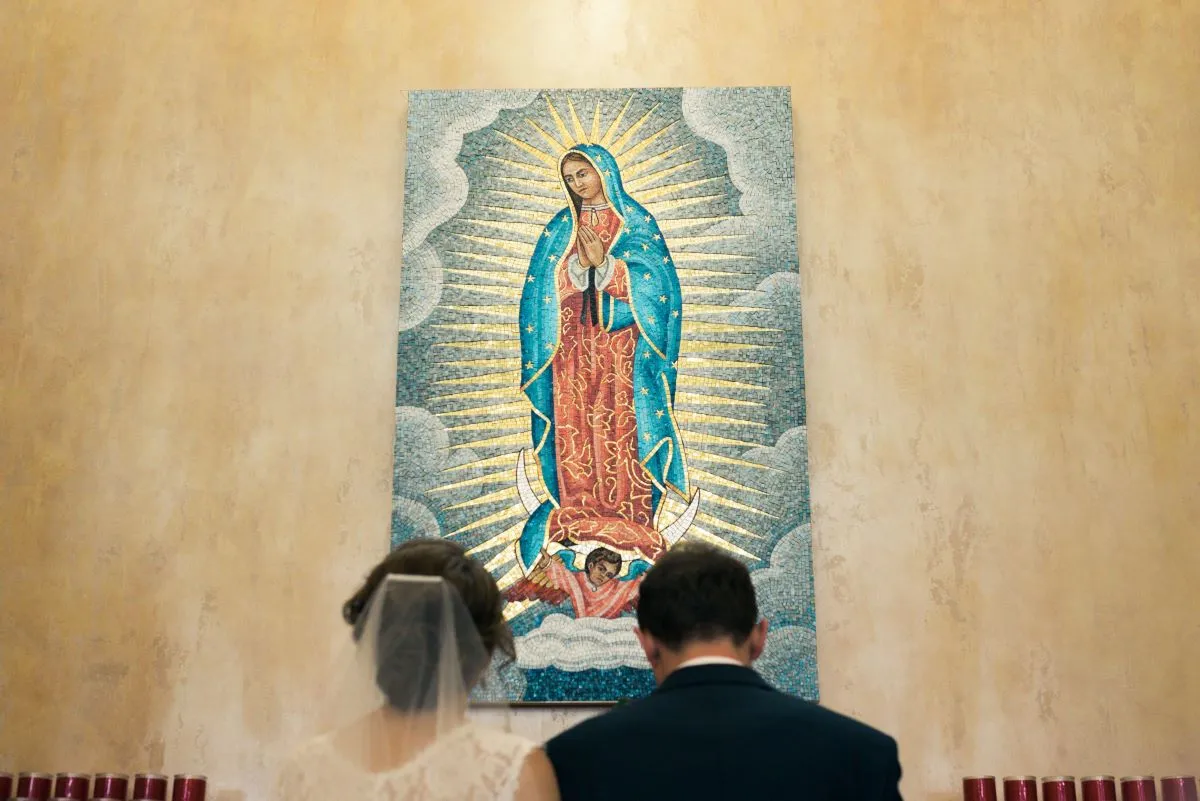Can A Christian Marry A Catholic? Examining Interfaith Marriage
With different Christian denominations, questions often arise around marriage between faiths. Specifically, many wonder if a Christian can marry a Catholic. While challenges exist, these interfaith unions are certainly possible.
In brief, the Catholic church generally allows marriages between Catholics and other baptized Christians. Some additional permissions are needed, preparation is required, and the couple must commit to certain faith practices.
However, for a respectful, committed couple that understands each other’s traditions, a successful Christian-Catholic union is achievable.
Catholic Church Laws on Interfaith Marriage
Permission Required But Unions Are Valid
When it comes to interfaith marriage, the Catholic Church has specific laws and regulations in place. While it is permissible for a Christian to marry a Catholic, there are certain steps that need to be followed in order for the marriage to be considered valid in the eyes of the Church.
The non-Catholic Christian party will need to obtain permission from their own church or religious authority to enter into a Catholic marriage. This is to ensure that both parties are aware of the implications of such a union and are committed to upholding the Catholic faith.
It’s important to note that even if permission is not obtained, the marriage can still be considered valid in the eyes of the Catholic Church. However, obtaining permission is strongly encouraged to ensure that the couple is fully aware of the religious responsibilities that come with a Catholic marriage.
Obligations for Catholic Spouse
Once the interfaith marriage is approved, the Catholic spouse has certain obligations that they are expected to fulfill. These obligations are in accordance with the teachings of the Catholic Church and are meant to ensure that the Catholic spouse can continue to practice their faith and raise their children in the Catholic Church.
- Participating in the sacraments: The Catholic spouse is expected to continue participating in the sacraments, such as attending Mass and receiving the Eucharist, as well as regularly going to confession.
- Supporting the Catholic upbringing of children: If the couple has children, the Catholic spouse has an obligation to ensure that they are raised in the Catholic faith. This includes teaching them about the Church’s teachings, bringing them to Mass, and encouraging their participation in religious education programs.
- Respecting the Catholic Church’s teachings: The Catholic spouse is expected to respect and uphold the teachings of the Catholic Church, even if their own beliefs differ. This includes matters such as contraception, divorce, and other moral issues that may be addressed by the Church.
It is important for both partners in an interfaith marriage to have open and honest discussions about their religious beliefs and practices. Seeking guidance from a priest or spiritual advisor can also be helpful in navigating the complexities of an interfaith marriage within the Catholic Church.
For more information on interfaith marriage within the Catholic Church, you can visit the United States Conference of Catholic Bishops website.
Premarital Preparation
Before a Christian and a Catholic decide to marry, it is essential for them to engage in premarital preparation. This preparation helps them to navigate the unique challenges that arise in an interfaith marriage and ensures that they have a solid foundation for a successful and fulfilling union.
Diocesan Marriage Prep Programs
Diocesan Marriage Prep Programs play a crucial role in preparing couples for interfaith marriages. These programs are designed to provide guidance on various aspects of married life, such as communication, conflict resolution, and shared values.
They also address the specific issues that may arise in an interfaith marriage, including discussions about religious practices, traditions, and raising children.
Attending a Diocesan Marriage Prep Program allows couples to learn from experienced mentors and engage in open and honest conversations about their religious differences. This can help them develop a deeper understanding and appreciation for each other’s faith, fostering a stronger bond and a more harmonious relationship.
Dispensations and Permissions
In some cases, a Catholic and a Christian may need to obtain dispensations or permissions from their respective religious authorities before getting married. This process involves seeking approval from the Catholic Church for a mixed marriage and may require the couple to meet certain conditions or fulfill specific requirements.
Dispensations and permissions are typically granted after careful consideration of factors such as the couple’s commitment to their faith, their willingness to respect and support each other’s religious beliefs, and their intention to raise any children in the Catholic faith.
The Catholic Church recognizes the importance of preserving the Catholic faith within the family and seeks to ensure that the couple understands and embraces this commitment.
It is important for couples to consult with their local diocese or parish to understand the specific requirements and procedures for obtaining dispensations or permissions. The guidance of a knowledgeable priest or religious advisor can be invaluable in navigating this process and ensuring that all necessary steps are taken.
Wedding Ceremony Considerations
When it comes to interfaith marriages between a Christian and a Catholic, there are several important considerations to keep in mind when planning the wedding ceremony. These considerations will help ensure that both partners feel respected and included in the celebration of their love.
Catholic Ceremony or Modified Rites
One of the main decisions to make is whether to have a Catholic ceremony or opt for modified rites that incorporate both Christian and Catholic traditions. If the couple decides to have a Catholic ceremony, it is important to understand the requirements set by the Catholic Church.
This may include pre-marital counseling, obtaining permission from the local bishop, and adhering to specific liturgical guidelines. The couple should also discuss their preferences with the priest or officiant to strike a balance between their respective faiths.
On the other hand, some couples may choose to have a modified ceremony that incorporates elements from both Christian and Catholic traditions. This can be a wonderful way to honor both faiths and create a unique and meaningful ceremony.
It is advisable for the couple to consult with their respective religious leaders to ensure that the modified rites still align with their beliefs and values.
Convalidation: Blessing a Non-Catholic Wedding
If one partner is not Catholic, it is important to consider the possibility of convalidation. Convalidation is the process of having a non-Catholic wedding blessed and recognized by the Catholic Church.
This can be done through a simple ceremony, where the couple reaffirms their commitment to each other in the presence of a priest or deacon. Convalidation allows the couple to have their marriage recognized by the Catholic Church, while still respecting the non-Catholic partner’s beliefs.
It is important to note that the specific requirements for convalidation may vary depending on the diocese or parish. Couples should consult with their local Catholic Church for guidance on the convalidation process and any necessary steps to take.
Making an Interfaith Marriage Work
Communication, Compromise and Tolerance
When it comes to making an interfaith marriage work, communication is key. Both partners need to openly discuss their beliefs, values, and practices, and be willing to listen and understand each other’s perspectives.
It’s important to have conversations about how each person’s faith will be incorporated into the relationship and daily life.
Compromise is also essential in an interfaith marriage. Both partners may need to make adjustments and find common ground when it comes to religious practices, traditions, and celebrations. This might involve attending religious services together, participating in each other’s rituals, or finding alternative ways to honor both faiths.
Tolerance is another important aspect of making an interfaith marriage work. Each partner should respect and accept the other’s beliefs, even if they don’t necessarily agree with them. This requires an open-mindedness and a willingness to embrace diversity within the relationship.
Raising Children in Two Faiths
One of the biggest challenges in an interfaith marriage is deciding how to raise children. It’s important for both partners to have an open and honest discussion about this before having children.
Some couples choose to raise their children in both faiths, exposing them to both religious traditions and allowing them to make their own decisions about their faith as they grow older. This can be a beautiful way to embrace both cultures and ensure that the children have a well-rounded understanding of different religious beliefs.
Other couples may decide to choose one faith to raise their children in, while still respecting and acknowledging the other partner’s beliefs. This can be a more practical approach, especially if the couple wants to provide a consistent religious upbringing for their children.
Ultimately, the decision on how to raise children in an interfaith marriage is a personal one that should be made by both partners with love, respect, and consideration for each other’s beliefs.
Conclusion
While requiring some additional steps, marriage between a Christian and Catholic can absolutely work with mutual love, respect and open communication. With proper preparation and understanding from both spouses, these interfaith unions can be as rich and fruitful as any marriage.








